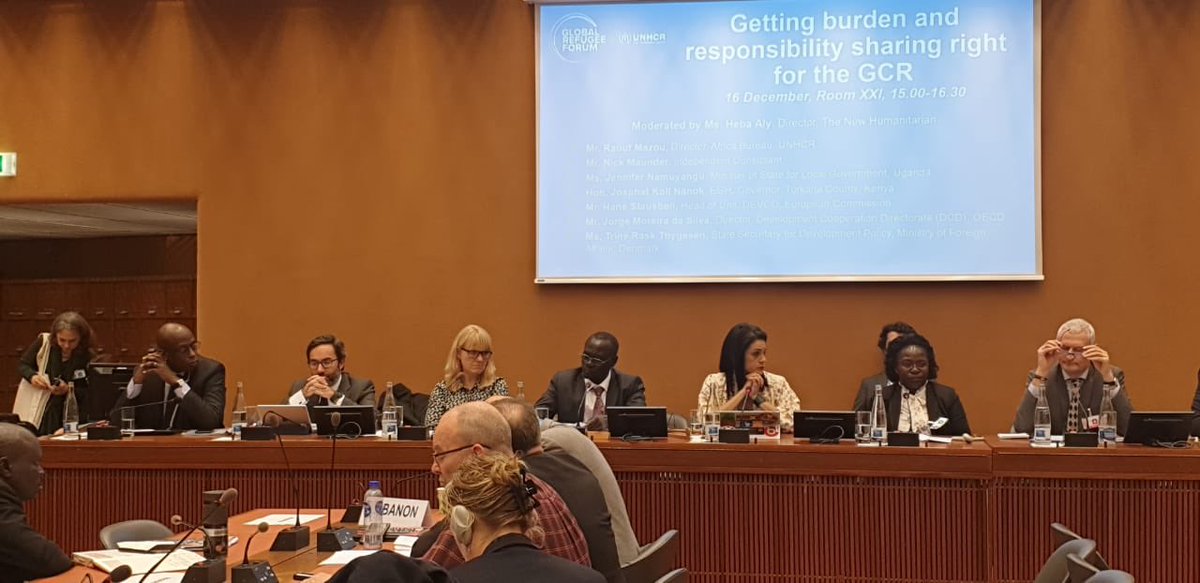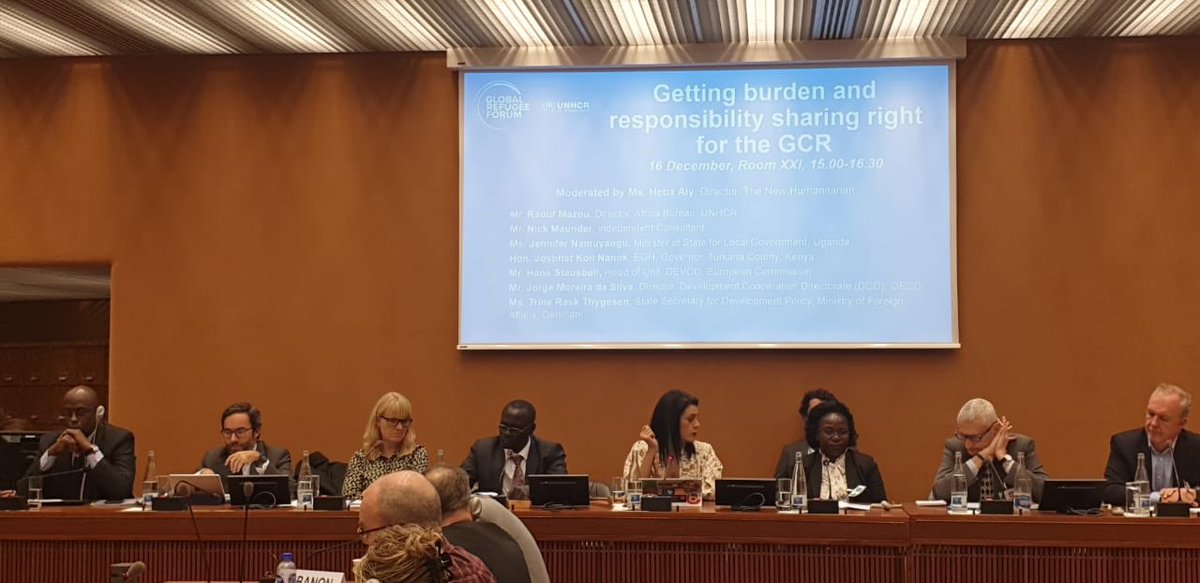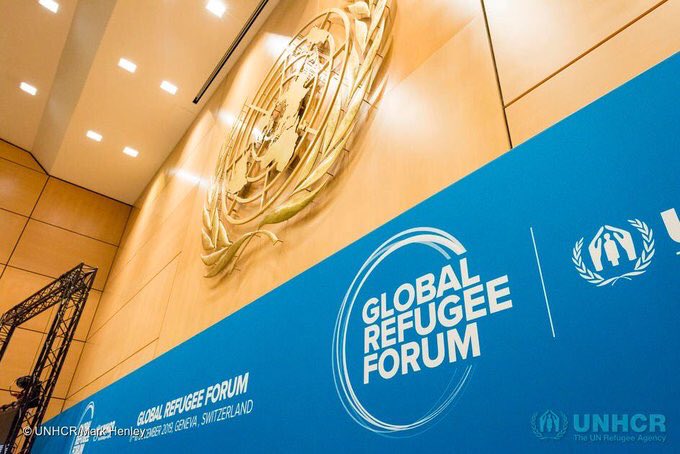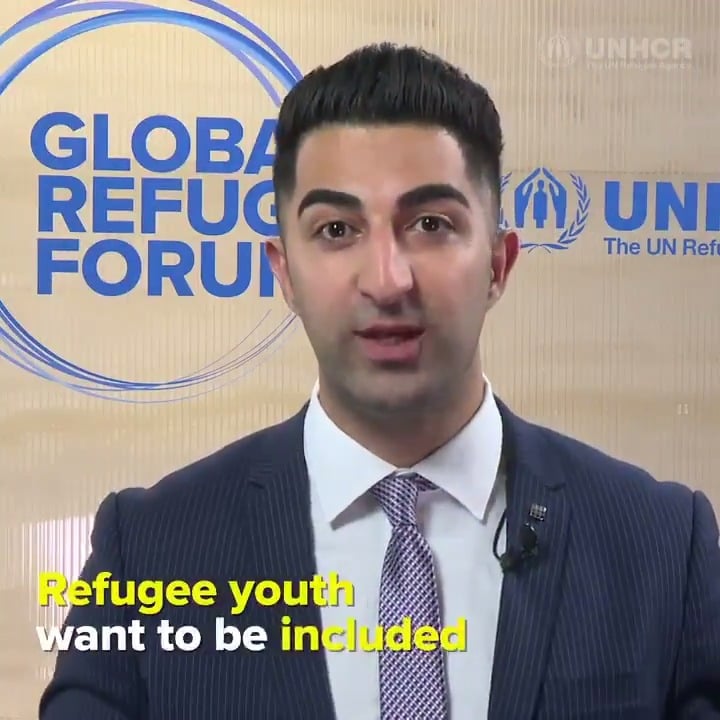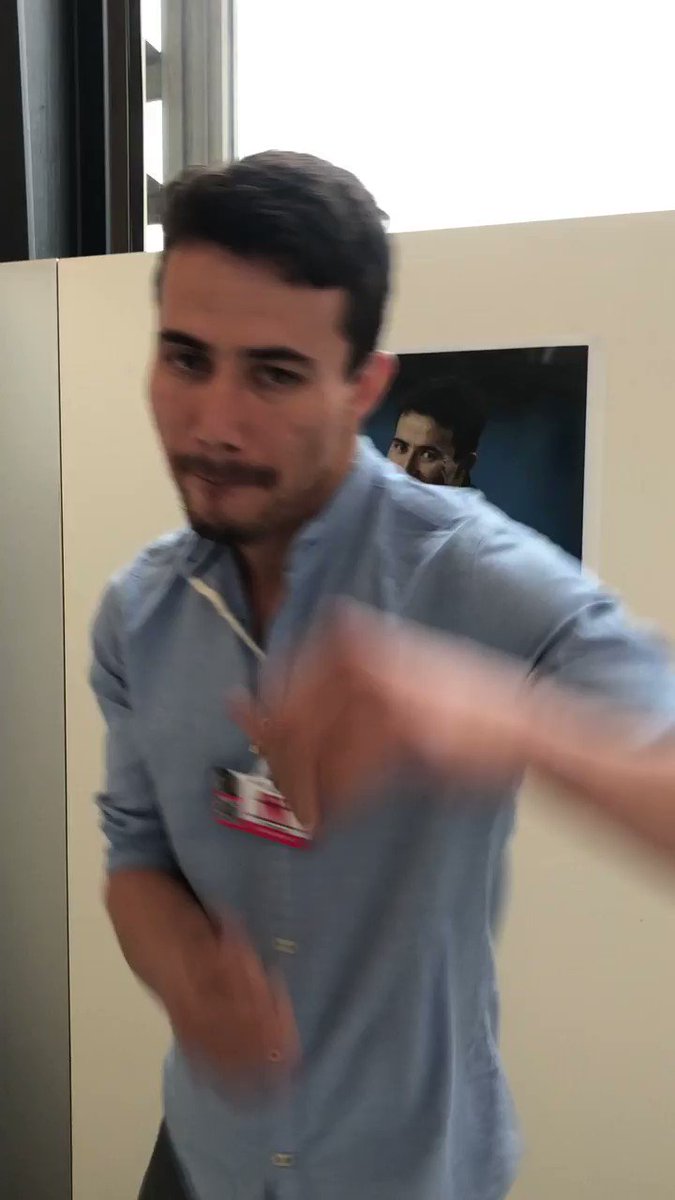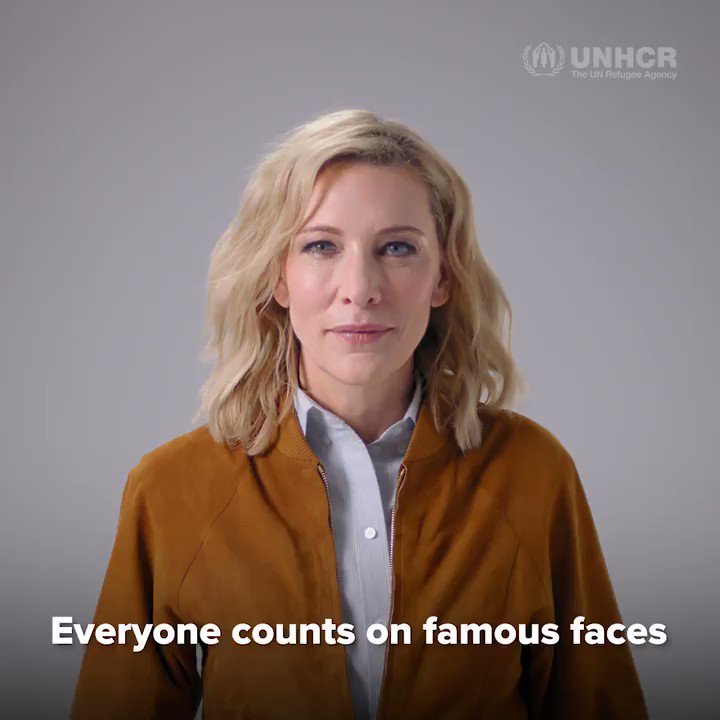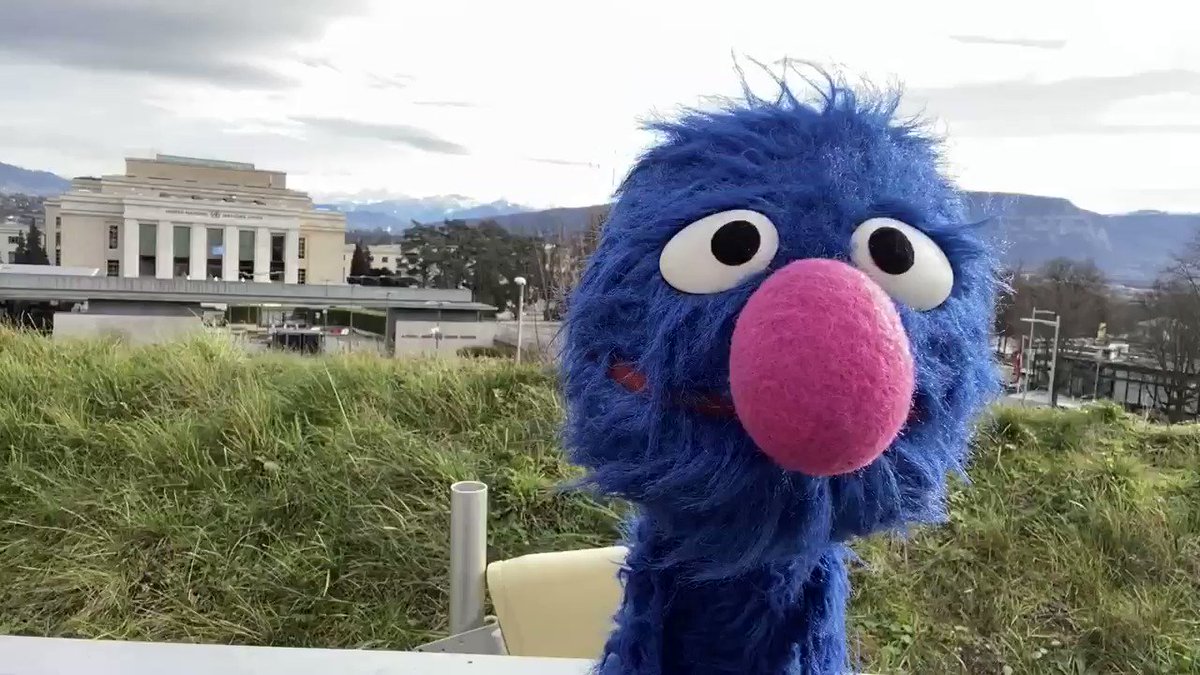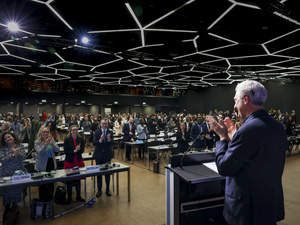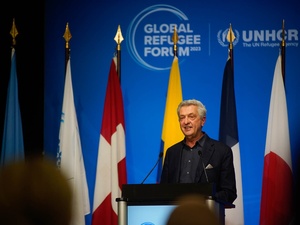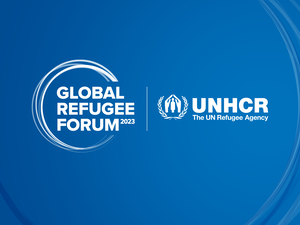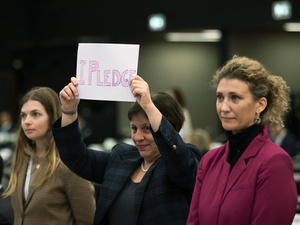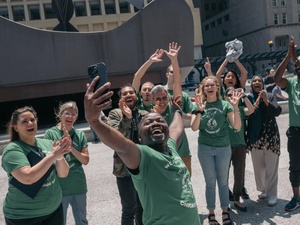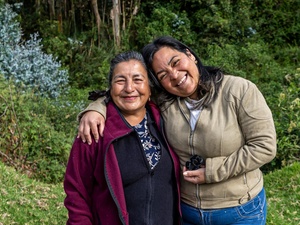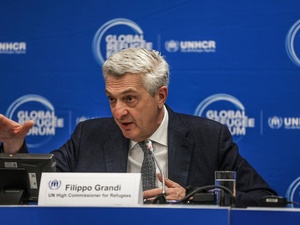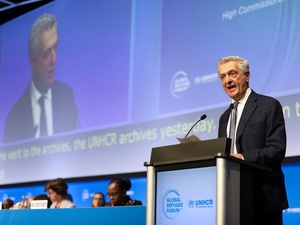Live blog: Global Refugee Forum -- Day 1

Live blog: Global Refugee Forum -- Day 1
The first Global Refugee Forum comes at the end of a tumultuous decade in which the number of refugees worldwide has doubled to well over 25 million.
From 16-18 December, the international community is coming together to announce bold, new measures to ease pressures on host countries, enhance refugee self-reliance, and find lasting solutions for those uprooted from their homes by wars and persecution.
Check back here throughout the day for updates:
Seeking solutions for millions of displaced Afghans
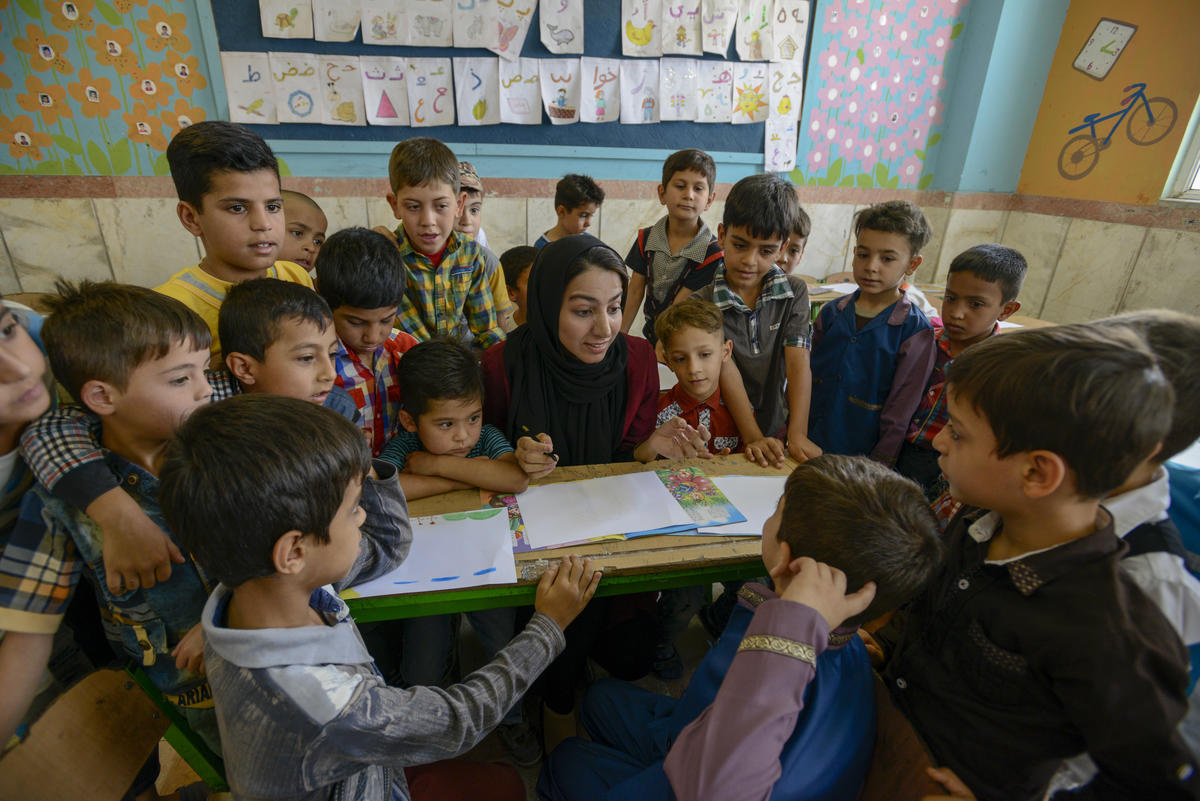
Afghan refugee Sonita, 25, teaches refugee children about Afghanistan at their school in Iran.
Forty years on from the start of the conflict in Afghanistan, finding solutions for the millions of Afghans who remain displaced is key to the country and the region’s collective future.
There are some 4.6 million Afghan children, women and men outside of Afghanistan, of whom 2.7 million are registered refugees. The vast majority have found sanctuary in neighbouring Iran and Pakistan.
Together with Afghanistan, the governments and people of these two countries are working together to protect and find lasting solutions for refugees. These range from allowing refugees to work, study and contribute to the countries hosting them, to supporting their voluntary return to their homeland.
The needs of Afghan refugees, as well as the host communities who have sheltered them for decades, are high on the agenda of this week’s inaugural Global Refugee Forum.
Today, on the margins of the Forum, the governments of Afghanistan, Iran and Pakistan have come together with UNHCR to launch a new Support Platform for the Solutions Strategy for Afghan Refugees (SSAR). Since 2012, the SSAR has facilitated dialogue, consensus-building and partnerships for the Afghan refugee situation.
The Support Platform being launched today reinforces these efforts and enhances coordination; it will help to ensure that humanitarian and development investments go hand in hand. The platform also encourages a wider range of partners to commit themselves to contribute to solutions for Afghan refugees, including non-traditional donors, development actors, civil society and the private sector.
Iran’s Deputy Foreign Minister Gholam Hossein Dehghani said he hoped the platform would encourage investments in workable and practical approaches to the Afghan refugee situation. “The SSAR support platform is a test case for the Global Compact on Refugees, as now it is high time for the international community to bring a balance and shoulder its responsibility, as Iran has been doing a lot,” he added.
Dr. Alema Alema, Afghanistan’s Deputy Minister for Refugees and Repatriation, expressed her appreciation for Pakistan and Iran for hosting Afghans for 40 years, and called on development and humanitarian actors to play their role and invest in Afghanistan.
"After the success of the peace process, we have in place a comprehensive plan for the dignified returns and sustainable reintegration of Afghans in Afghanistan," she said.
All aboard the Solidarity Train for Refugees
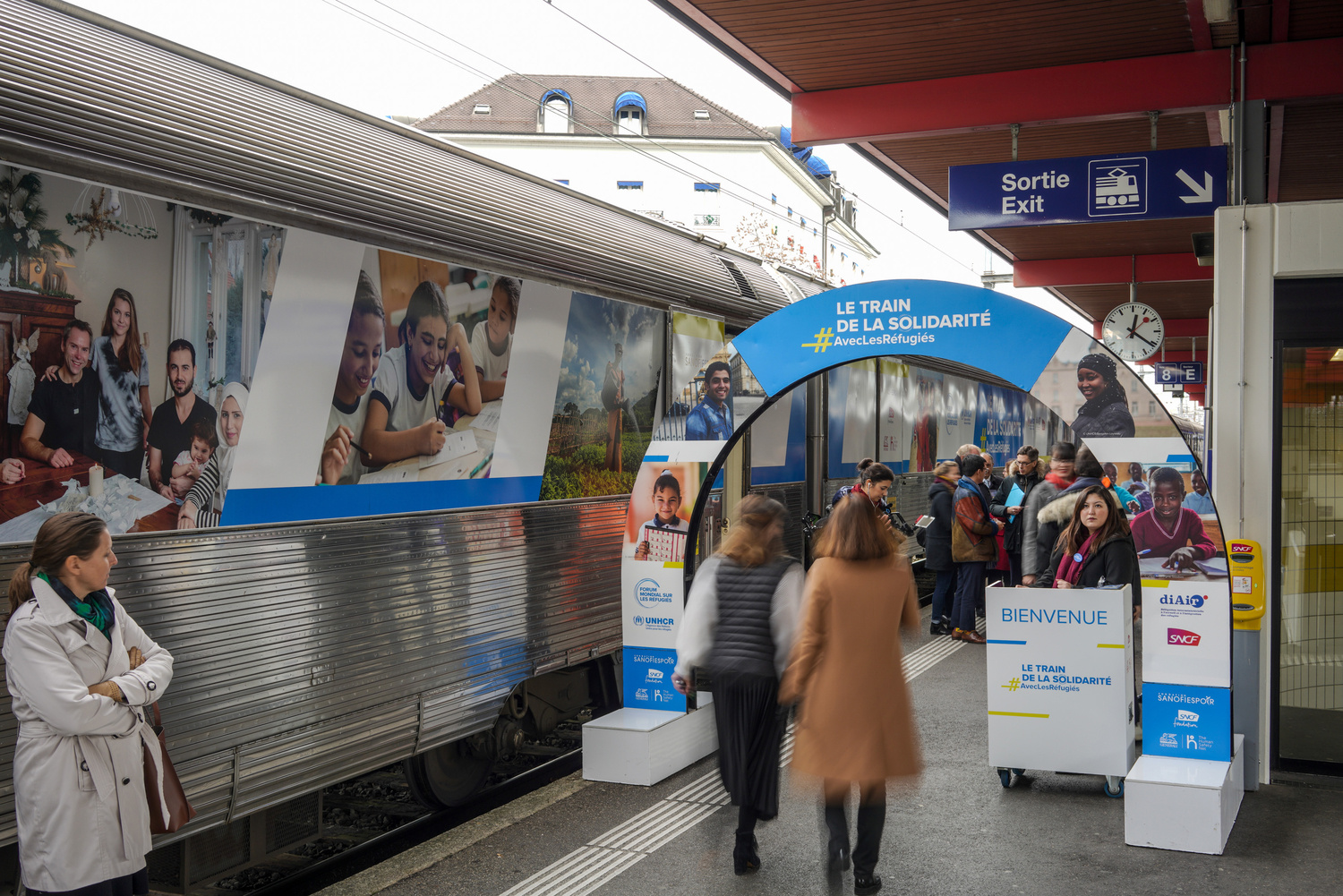
The Solidarity Train reaches the end of the line in Geneva, Switzerland, for the start of the Global Refugee Forum.
In late November, a train pulled out of Gare de Lyon station in the French capital. All day, trains leave the station carrying commuters or intercity passengers, but this one was special.
The Solidarity Train for refugees and French people involved in refugee integration visited French towns and cities including Bordeaux, Clermont Ferrand, and Lyon. Its aim: to promote best practise on refugee integration.
At each place, it held events and drew crowds.
“To be a refugee is a legal status so it should not define the person. Before being a refugee you were something else. It’s important to guard this human quality. We are not just numbers,” said Leen Youssef, a refugee from Syria.
The project is a partnership between UNHCR, the UN Refugee Agency, SNCF, the French national train company, DIAIR, a French inter-ministerial delegation for the reception and integration of refugees, and Trains Expo, the events arm of SNCF.
On Monday, the train finally arrived in Geneva in time for the start of the Global Refugee Forum. Filippo Grandi, the UN High Commissioner for Refugees was among the crowd that welcomed it.
“I'm very happy we could unite these two initiatives, one that carries a message of solidarity and the other that seeks practical measures. But without solidarity we can't do anything,” Grandi said.
SNCF Company Secretary Stéphane Volante added: "The train is an emblematic mode of transport in France, in Europe and around the world. It's a beautiful tool to connect people together, and creating human connection is ultimately what solidarity is."
Addressing displacement in Central America
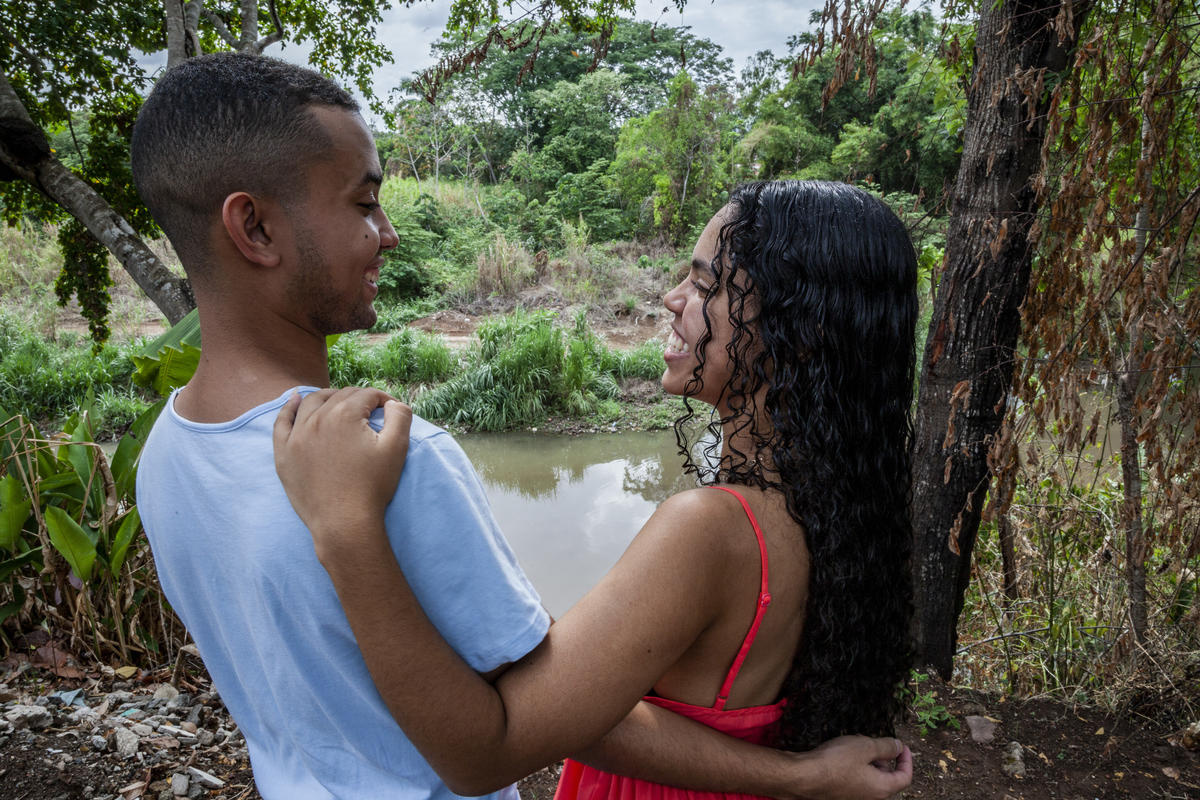
Panamanian Miguel, 16, and Venezuelan refugee Maria, 15, share a moment in Panama City, Panama.
Discussions took place at the Forum today on taking concrete steps to help people uprooted by violence and persecution in Central America, and ensure they have full, meaningful lives while in exile across the region
The countries of the North of Central America—El Salvador, Honduras and Guatemala—are some of the most violent in the world, beset by crime that is largely fuelled by street gangs and drug cartels. Additionally, persecution is driving Nicaraguans to seek safety abroad.
An estimated 800,000 people have been forced from their homes. While some 470,000 of them have crossed borders to find protection as refugees or asylum seekers, 320,000 are displaced within their own countries.
“The stark choice now facing thousands of families and young women and men from throughout the region is to leave or die,” UN High Commissioner for Refugees Filippo Grandi said. “Tackling the causes of displacement, and creating opportunities for refugees to live safe and meaningful lives is the challenge facing us today.”
To address the pressing issues faced by countries of origin, transit and asylum, Belize, Costa Rica, El Salvador, Guatemala, Honduras, Mexico and Panama came together two years ago to forge a regional response.
They adopted the so-called Comprehensive Regional Protection and Solutions Framework, an alliance known by its Spanish-language acronym, MIRPS, which is aimed at fostering collective approaches needed to respond to the trans-national issue of forced displacement.
The countries showcased the difference this strategic alliance is making in the lives of forcibly displaced people, by allowing them to work, put their children through schools and access healthcare while in exile.
“Those who have to move because of violence or insecurity, do they leave their rights in their countries of origin? No. That's why we have to embrace multilateralism and responsibility sharing to better assist forcibly displaced people,” said Carlos Alvarado Quesada, President of Costa Rica.
“The success of this initiative is key for a better future. With true action, we can build optimism through multilateralism and overcome negativity.”
Some 200 participants attended the high-level meeting, which included presentations by ministers representing all seven participating nations, highlighting their best practices and identifying remaining gaps and needs.
Mexico’s Vice-Minister for Human Rights, Migration and Population, Alejandro Encinas, pointed to his country’s practice of issuing registration numbers to those seeking asylum both as a means of identification and to enable them to access health and education services.
“We will also continue with our Labour Integration Programme that has granted nearly 5,000 permanent jobs for refugees and asylum seekers,” he added.
Because funding to address forced displacement in the region has lagged consistently behind, the event was also an occasion for donors to make the financial commitments needed to strengthen the region’s shared solutions to the spiraling problem of forced displacement.
Award-winning surgeon speaks on improving maternal health
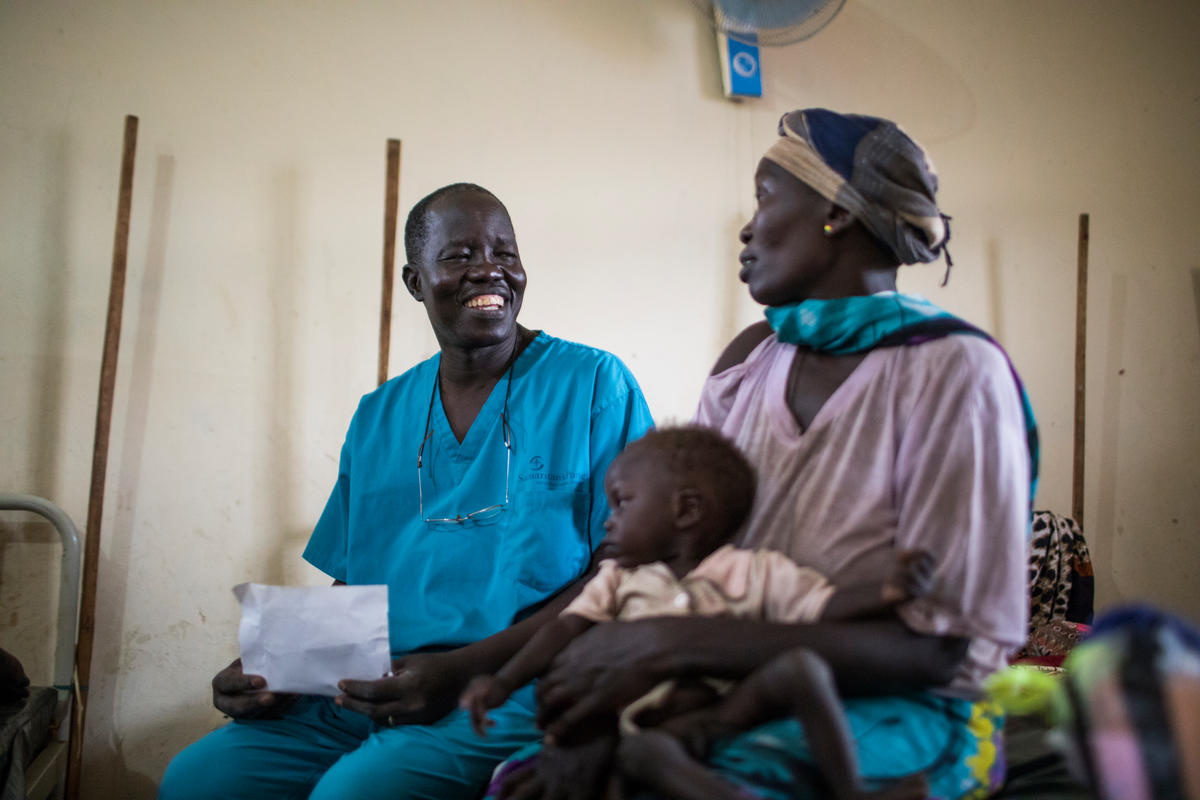
Dr. Evan Atar Adaha sits with a refugee from Sudan and her malnourished son in Bunj, Maban County, South Sudan.
At a Forum session on reducing maternal and newborn deaths, UNHCR’s Nansen Refugee Award 2018 winner Dr. Evan Atar Adaha has spoken about the challenge of providing maternal and newborn health services in emergency settings.
Dr. Atar touched on his own experience of conditions in Maban, South Sudan, and explained why improving the security situation in refugee camps and host countries would help to ensure better access to maternal and newborn health services, as well as guaranteeing proper facilities and qualified staff.
Cultivating good and prosperous relations between refugees and host communities is key to protecting both mothers and newborns, he said. Also crucial, he added, is tackling cultural gaps such as the fear of blood transfusion and finding blood donors, through better education of both men and women.
The panel was chaired by Mr. George Okoth-Obbo, UNHCR Assistant High Commissioner for Protection and included Her Royal Highness Princess Sarah Zeid, UNHCR Patron for maternal and newborn health, the Honorable Doctor Joyce Moriku Kaducu, Minister of Primary Health Care of Uganda, and featured a keynote speech from Her Excellency Emine Erdogan, First Lady of the Republic of Turkey.
“Maternal and newborn mortality is a shared issue for host communities and refugees,” Dr. Atar told participants. “We still have Female Genital Mutilation (FGM), we still have early marriages, this all contributes to difficult labour.”
“We can save lives if we put our hands together. We need collective efforts and do it!”
When welcoming refugees, it’s crucial to share the responsibility
People who flee their own countries need to find a welcome in a new one. But for that welcome to be sustainable, the responsibility for the newcomers must be shared.
The Global Compact on Refugees examines this key challenge, and on Monday it was the subject of a spotlight session at the Global Refugee Forum.
The Horn of Africa was used as an example that the rest of the world could learn from. At the same time, government officials from Kenya and Uganda said much remained to be done in terms of devising integrated programmes that benefit both refugees and local populations.
“We have learned that as displacement takes many years to solve we need to look at displacement as a development issue,” said Jennifer Namuyangu, Uganda’s Minister of State for Local Government.
“We have decided that our model should not be to restrict the refugees into camps,” she said, describing her own country’s approach.
One key is to create appropriate incentives that continue to work over time. This includes making policies and strategies sensitive to the reality of displacement, including on issues such as finance, analysis and planning.

Kenya, in partnership with UNHCR, the UN Refugee Agency, is implementing the Kalobeyei Integrated Socio-Economic Development Plan in Turkana West as one key approach to the issue.
Josphat Koli Nanok, Governor of Turkana County, said other parts of the country that host refugees could learn from the experience in Kalobeyei.
Insights were gleaned from the roll out of the Comprehensive Refugee Response Framework in Uganda, Ethiopia, Kenya and Somalia.
The drive for comprehensive approaches aims to ensure refugee protection and improved and sustained access to basic services, incomes and livelihoods for both refugees and host communities, while taking into consideration refugee movements.
One key question is how national and international development actors can contribute to this process by adapting policies, strategies, programming, financing and internal procedures as needed.
Global cities embrace refugees
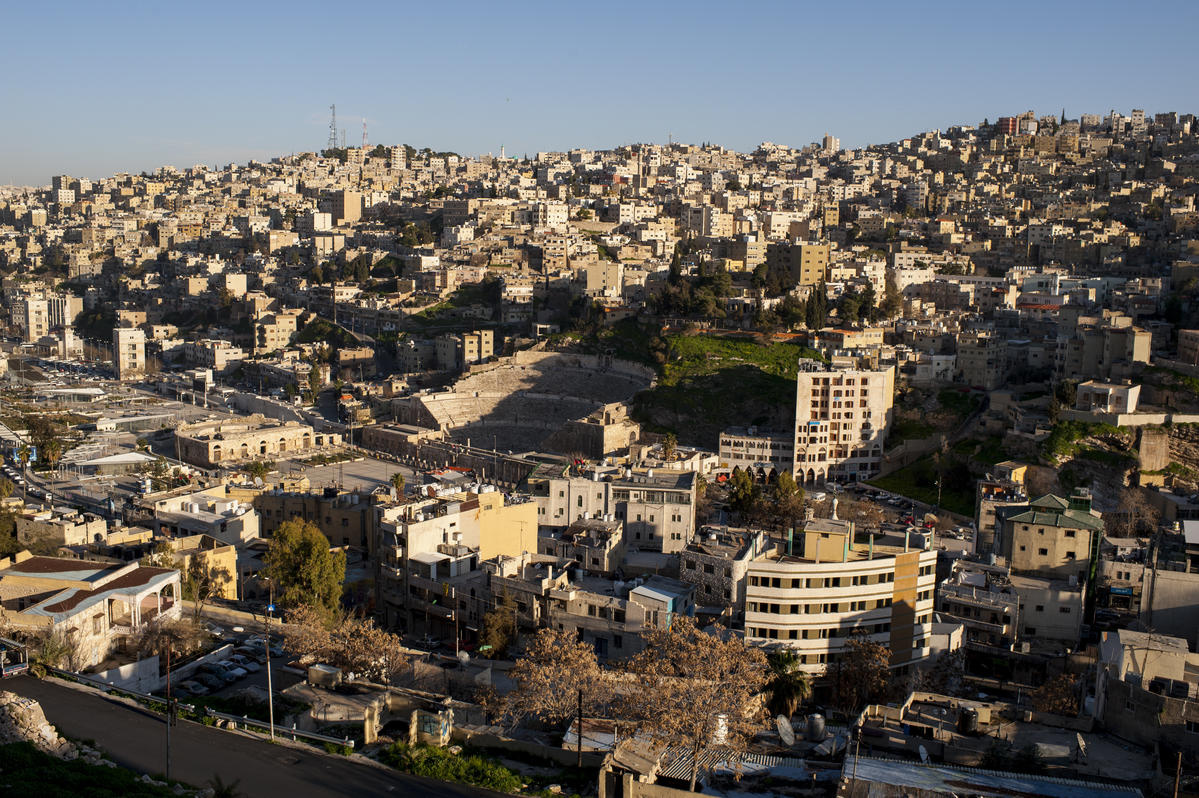
A view of downtown and the Roman Amphitheater in the Jordanian capital Amman.
A majority of the world’s 25.9 million refugees live out of camps and in cities and urban areas across the Americas, Europe, the Middle East, Africa and Asia.
Finding themselves on the frontlines of the global refugee response, an increasing number are choosing to empower refugees and embrace the opportunities they bring.
Today at the Forum, civic leaders from as far afield as Durban, South Africa, Gaziantep, Turkey, and Amman, Jordan shared what steps they are taking to make it easier for refugees to thrive in the cities that welcome them.
Over two years, Durban will set up “one-stop shops” to provide information as well as linguistic and cultural mediation for migrants, refugees and asylum-seekers, so that they can effectively access health, education and welfare services.
“Rapid urbanization … brings about social and economic challenges, but also a host of opportunities that we want to take advantage of,” said Durban Mayor Mxolisi Kaunda.
With fully 61 per cent of all refugees living in urban settings, mayors, city administrations and local authorities and their local partners have become some of the most important stakeholders in the delivery of protection and assistance in urban spaces.
These Cities of Light have taken the initiative by including refugees in planning, helping them to learn local languages, find housing and work – often without the additional resources required. Mayors called for deeper collaboration between city governments, local leaders and the international community.
“Jordan needs the assistance of the international community and to deepen partnerships with development actors,” said Amman's Mayor Yousef Al Shawarbeh.
Today’s pledges also further both UNHCR and its partners’ commitment to the Sustainable Development Goals, and meeting the aims of the Global Compact on Refugees, a framework for more predictable and equitable responsibility-sharing affirmed by the UN General Assembly a year ago.
Cities are stepping up and taking bold action to welcome and integrate newcomers, turning the commitments of the Compact into reality. “But they cannot do it alone,” said Vittoria Zanuso, Executive Director of the Mayors Migration Council. “We call on humanitarian and development actors, national governments, and private sector leaders to help cities access the financing, technical assistance, and political support they need to deliver faster results on the ground.”
UNHCR’s #WithRefugees campaign invites cities and local authorities all over the world who are working to promote inclusion, support refugees and bring communities together to sign a statement of solidarity with refugees, with 236 cities already signed up.
Getting due recognition for refugees’ qualifications
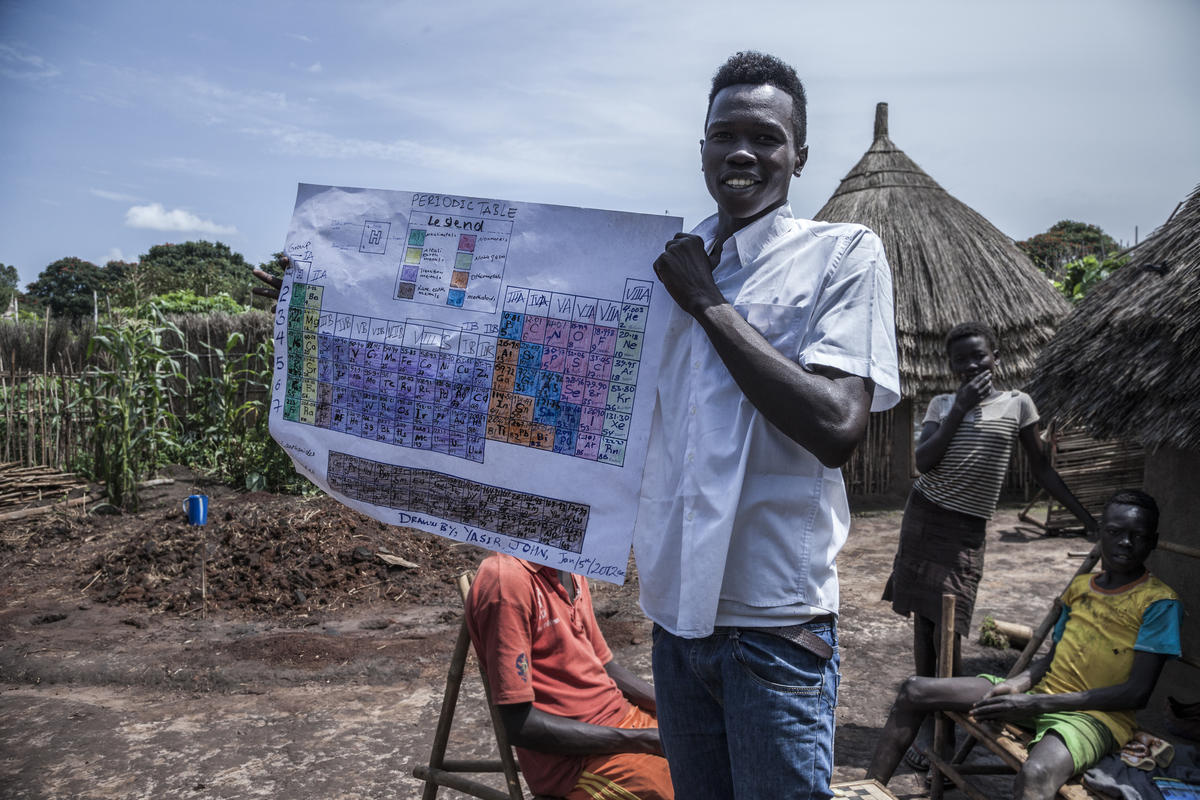
Sudanese refugee John displays the homemade periodic table that helped him study for a university place in Ethiopia.
Policy-makers, academics, students and independent experts have today discussed new approaches on how refugees can access education while in exile, and get recognition for the hard-won qualifications they gained in their home countries.
A record 25.9 million have fled their homes and live as refugees, about half of them children. Many refugees struggle to continue their studies, having been forced to leave behind certificates or other proof of their academic credentials.
Earlier today, representatives from Zambia showcased some of the innovative work already underway in the country to help refugees have their previous education levels acknowledged. Since October, the launch of a Refugee Qualifications Passport has helped around a dozen refugees to resume their learning or have their skills formally recognized with employers in Meheba settlement.
UNESCO, as the UN agency lead for the Sustainable Development Goal’s aims on education, is drawing on the experience in Zambia and similar initiatives to develop a UNESCO Qualifications Passport that would allow refugees to have their qualifications recognized around the world.
The model is based on the European Qualifications Passport for Refugees, or EQPR, launched earlier this year by the Council of Europe and UNHCR, the UN Refugee Agency. It has allowed hundreds of refugees who fled conflict and persecution to pick up their education where they left off.
“This will help people who possess the knowledge but don’t possess the papers,” said Muhammed, a Syrian refugee living in Germany who spoke at today’s event on the importance of access to tertiary education for refugees. “There is a lot of potential amongst refugees that is being unused, there are brilliant minds available that these passports can unlock.”
Similar pilot projects are set to be rolled out in 2020 in Iraq and Colombia, thanks to support from Dubai Cares.
UNHCR is also strengthening its partnership with academic institutions and researchers, particularly in the Global South, through the launch of the Global Academic Interdisciplinary Network. The network will begin virtual working groups for academic institutions, scholars, teachers, foundations and beyond who are producing research to support refugee students and scholars, as well as teaching on refugee, statelessness and displacement issues.
“We’re coming up with an academic network to have a strong voice to advocate for issues affecting refugees,” said Teresa Bitengo Mwoma, Senior Lecturer at Kenyatta University Dadaab Centre. “We need refugee voices and the Global South to influence policy-making, to develop policies that support refugees and to strengthen the partnership with the Global North.”
States work together to address displacement in Horn of Africa
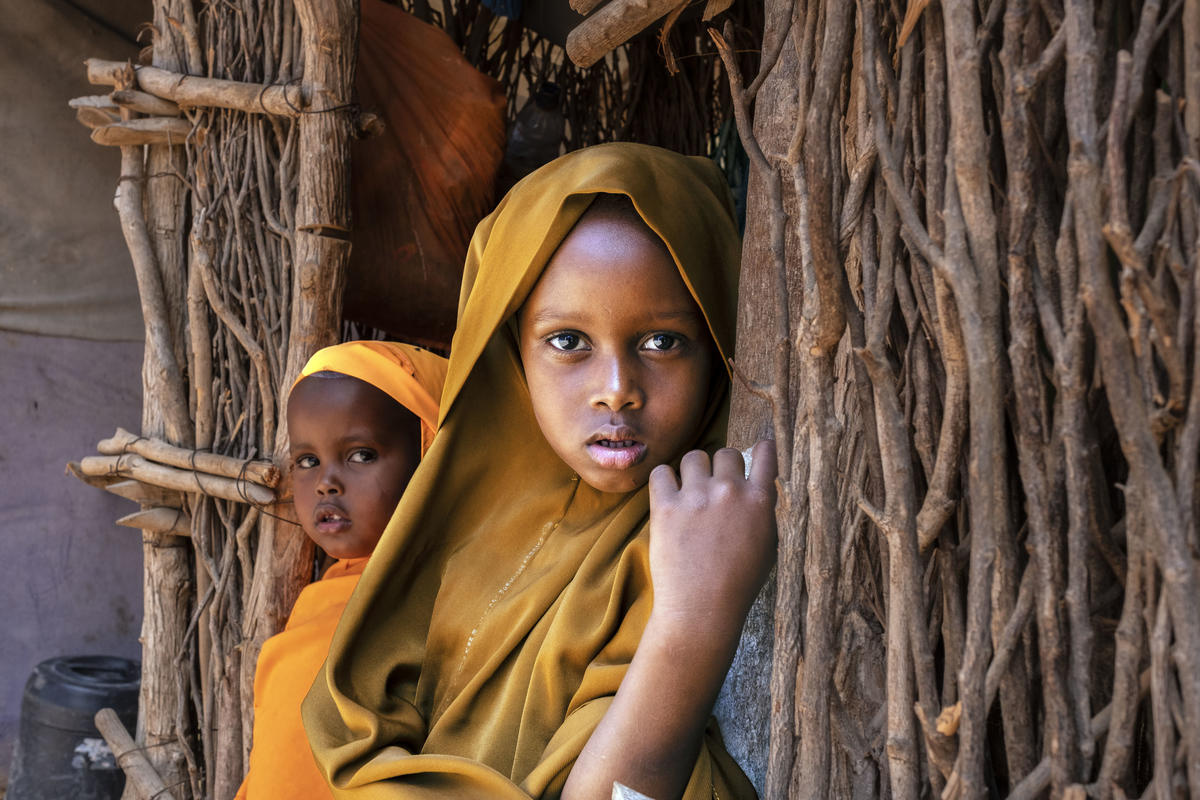
Five-year-old Somali refugee Filsan, who wants to be a doctor, looks out from her home in Dadaab, Kenya.
Seven African countries that agreed to find long-term solutions to refugee situations in the Horn of Africa by taking a comprehensive regional approach are coming together today to share their progress at the Forum in Geneva.
Signed two years ago, the historic Nairobi Declaration agreement demonstrates a commitment to address the rising needs of millions.
Now, Djibouti, Ethiopia, Kenya, Somalia, South Sudan, Sudan, and Uganda will look at best practices, challenges and the way forward. The states form a regional political body called IGAD, or the Intergovernmental Authority on Development.
“IGAD and the countries in it are at the forefront of adopting new approaches to dealing with refugees,” said UN High Commissioner for Refugees Filippo Grandi. “It may be a region of great displacement, but has also become a region of solutions and opportunities.”
IGAD was the first regional application of the Global Compact on Refugees, affirmed by the UN General Assembly in December 2018 and aimed at strengthening the international response to refugee situations.
Since then, IGAD members have gone even further, agreeing to standardize education for refugees across Eastern Africa by 2020 and expand economic and work opportunities.
These declarations are more than signed documents – they are changing the reality for refugees on the ground.
In Ethiopia, a new law allows refugees to open bank accounts and receive work permits. Uganda has gone beyond its long-standing policy of giving refugees land, allowing freedom of movement and the right to work and own businesses, as well as including refugees in their national education and healthcare plans. And in Somalia, the government has been making strides in improving governance and infrastructure, even as the country rebuilds after decades of instability and continued security challenges.
Participants at today’s meeting identified remaining gaps and needs. The event also saw the launch of a support platform, enabling humanitarian and development organizations, private sector actors and donors to make concrete pledges of support to show solidarity with IGAD countries and help to improve the lives of refugees who live there.
Providing education for refugee children in emergencies
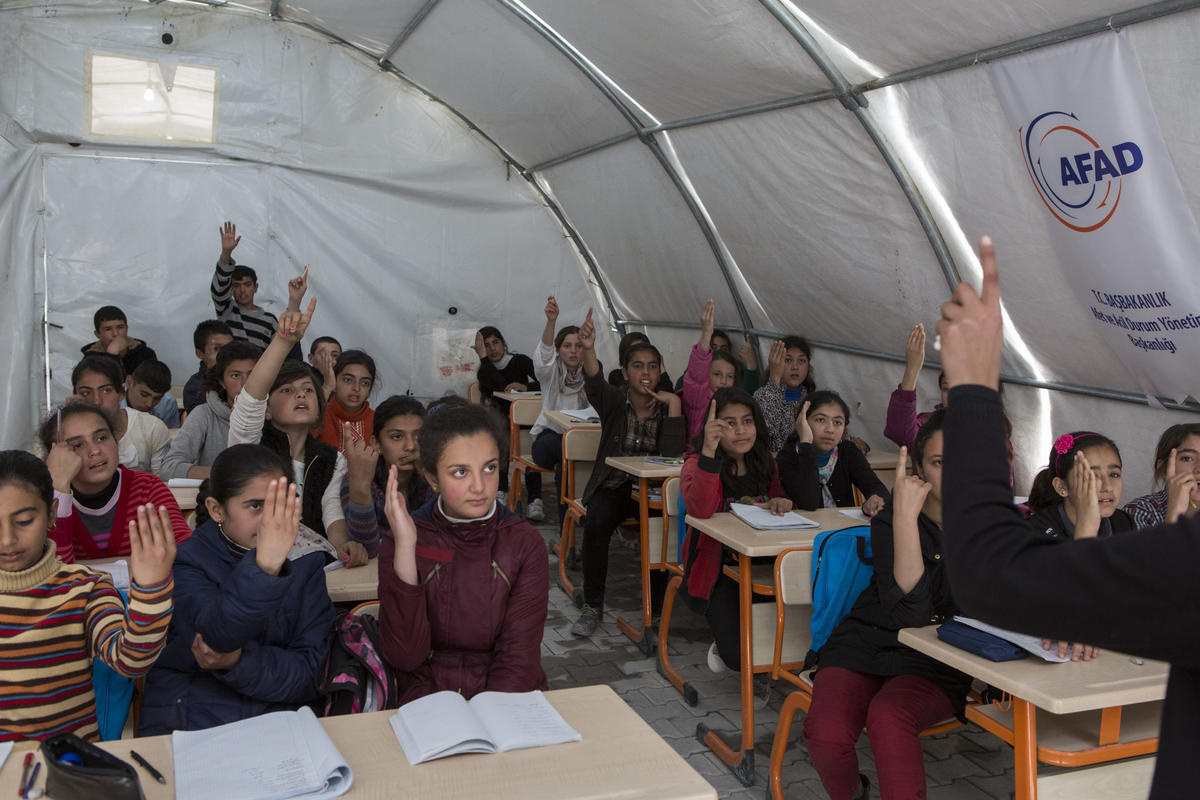
Syrian refugee children attend school at a camp in Suruc, Turkey.
Children who flee conflict and persecution have lost so much already that they must not be allowed to lose their future.
That was the message today at a side panel on reframing education in emergencies, at which representatives from countries on the frontline of today’s refugee crises shared some of their measures to get kids into school.
“These kids have lost almost everything in their lives, they need a dream,” said Reha Denemeç, Turkey’s deputy minister of education. “Through education we are providing that dream,” he said.
Turkey currently hosts nearly 3.7 million refugees who have fled the conflict in neighbouring Syria, of whom 1.082 million are school-aged children
More than 684,000 Syrian children are enrolled in schools in Turkey, with 93 per cent getting a primary education, and 70 per cent in lower secondary school, according to figures circulated at the event.
Colombia, meanwhile, has received an influx of more than 1.6 million Venezuelan refugees and migrants escaping persecution, economic collapse and chronic shortages at home.
Raúl Hernández, director of Colombian non-profit Opción Legal, told the panel that school-aged Venezuelan children are actively enrolled in schools, regardless of whether they have documents. And to make sure that they do not miss out, authorities set out across the capital Bogotá to find them.
“The education authorities don’t wait for the children to show up at school, they go and look for them house by house,” Hernandez said.
Other speakers included Aggrey Kibbenge, permanent secretary at the ministry of education and sports in Uganda, which hosts more than 1.3 million refugees, 60 per cent of them children.
He highlighted a comprehensive education and response plan for refugees and their host communities which he said is “a template for the region.”
Supporting the displaced through Islamic Finance
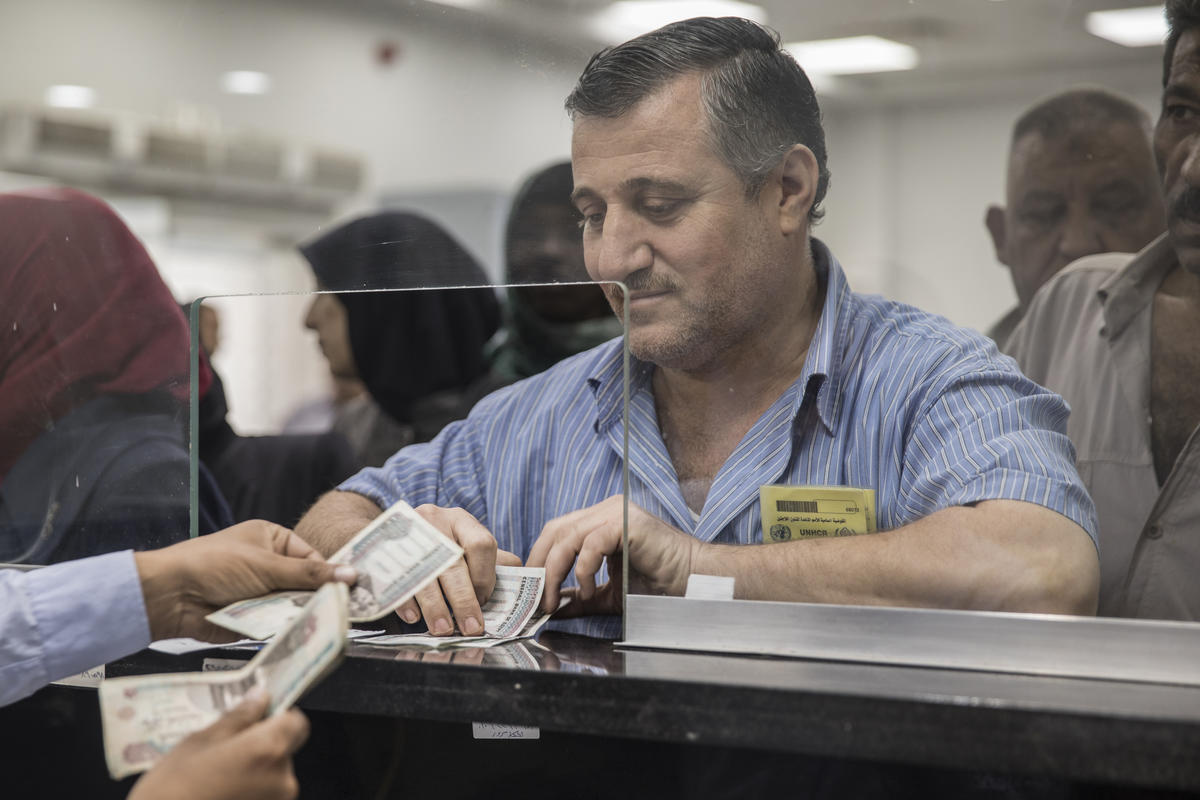
Maher, a Syrian refugee, collects his monthly cash assistance at a post office in Cairo.
Finding the best ways to support the forcibly displaced through Islamic finance was debated by industry experts and representatives from leading financial institutions at the Forum today.
Amongst the pledges was an agreement to launch the first global platform through which Islamic Finance Institutions can commit to providing Sharia-compliant, long-term support to refugees, internally displaced people and their host communities.
“Islamic Finance Institutions are playing increasingly instrumental roles in the humanitarian and development responses to global refugee crises,” said UN High Commissioner for Refugees Filippo Grandi.
“We hope that these innovative, new approaches to Islamic Finance will help accelerate support and assistance to millions of refugees around the world.”
UNHCR has pioneered the ‘Refugee Zakat Fund’, allowing Muslims to contribute towards life-saving humanitarian assistance for refugees.
Each year, between US$200 million and US$1 billion is raised during the month of Ramadan, as part of Zakat obligations, through which every Muslim of a certain level of wealth is required to make charitable contributions to the poor and needy.
UNHCR’s Zakat programme is fully compliant with the requirements of Sharia and has been given approval through fatwas from five leading scholars and institutions.
More than US$40 million has been donated in Zakat so far this year to help hundreds of thousands of refugees and internally displaced people (IDPs) in places such as Yemen, Lebanon, Iraq, Egypt, Jordan, Mauritania and Bangladesh.
These efforts are being further complemented by creative approaches to other Islamic Social Finance tools, such as Sadaqah (voluntary giving), Waqf (Islamic endowment funds), and Sukuk (Islamic bonds).
“Refugees are amongst the most vulnerable people in the world. We are going to find a way, so that the next time a refugee crisis comes, we can raise a lot of money fast, and already have a pool of resources available to help from the start. I believe this is the start of a commitment from Islamic institutions to help refugees around the world,“ said Hamid Rashid, founder of Finterra, a blockchain technology platform that has pledged to launch the world’s first Waqf for refugees.
Let refugees speak: Refugees make voices heard at global forum
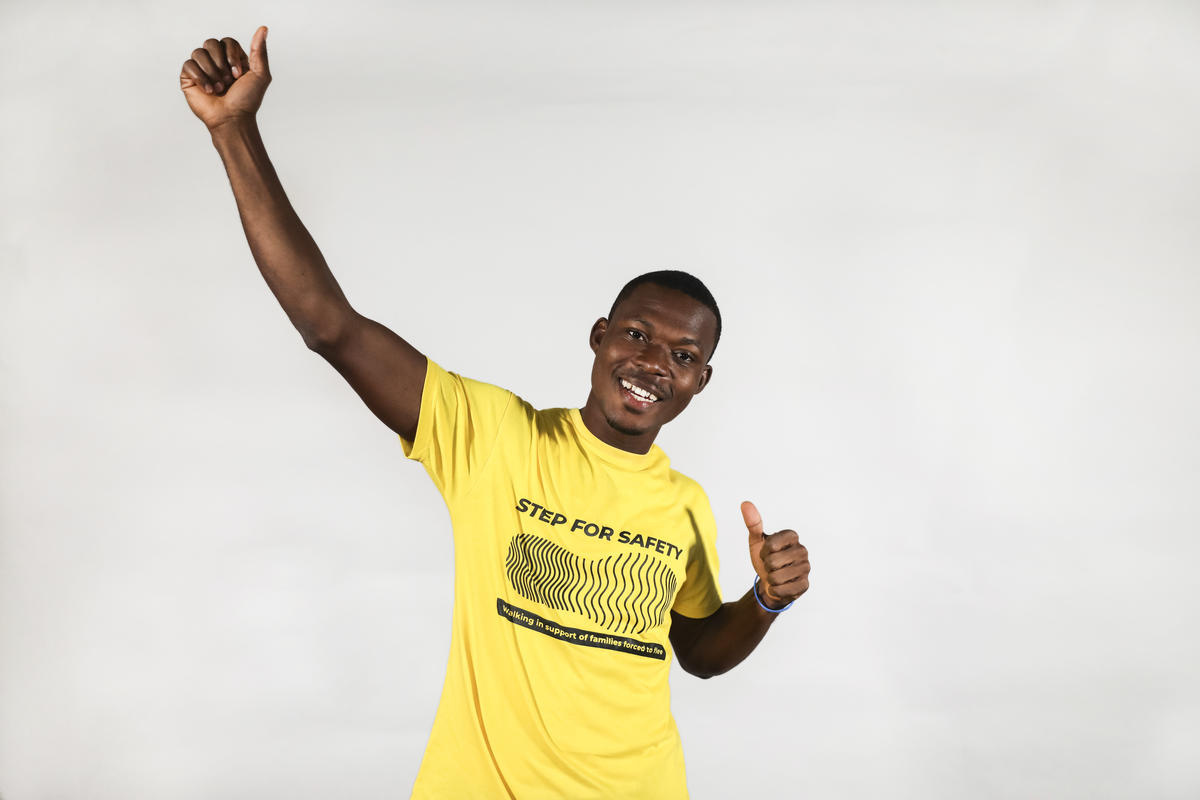
Felix Sesay, who is attending the Global Refugee Forum, pictured at UNHCR Headquarters in Geneva, Switzerland.
What is the correct place for refugees at the Global Refugee Forum? A panel at the start of the three-day meeting made the answer clear: right at the centre.
Four refugees told their personal stories on Monday and said what they believe the Forum can achieve for the more-than 70 million refugees and displaced people around the world. Others spoke too.
“Refugee youth want to be included. They want to be heard. They are so eager to contribute back to the community,” said Arash Bordbar, a refugee from Iran currently living in Australia. Arash co-chairs the Youth Advisory Council of UNHCR, the UN Refugee Agency.
“Invest in young people and build resilience in the community,” he said.

Yasin Jama, who arrived in Paris from Somalia, said it was crucial that policymakers listen to refugees.
The priority should be “to find ways to work together with global and local institutions to work with refugee-led initiatives,” he said. Yasin added that when he arrived in the French capital, he struggled to find help learning the language and opening a bank account. Since then, his life has improved and he has also started an association to help asylum-seekers.
“Refugees must keep in mind the well-being of the country that has welcomed them,” said Jacqueline Zandamela. In 1994, she fled to Mozambique from the country that is now the Democratic Republic of the Congo.
She has learned Portuguese, opened a fashion business and raised four children in the years since. She has also set up several initiatives to help other refugees, single mothers and other people in difficulty.
“The change I would like to see after this forum would be that governments will try to encourage the quality of life for refugees in their host countries,” said Diego Narvaez. Diego fled Colombia with his family to Ecuador and faced many difficulties growing up. He is currently studying international relations at university in the Ecuadorian capital.
Felix Sesay, who came to Ghana from Sierra Leone as a child and now studies nursing, had a more general answer to the question of what the Forum could achieve.
“This is an opportunity for the world to make an impact in solving the refugees problems,” he said.
Refugee boxer gives knockout performance
Refugee boxer and Olympic hopeful Farid Walizadeh has been helping Forum participants to understand how sport can positively impact refugee lives.

In a session run in collaboration with the Olympic Refuge Foundation (ORF) and the International Olympic Committee, participants listened to Walizadeh’s experience and discussed ways of ensuring that all refugees have the opportunity to play sport.
“It is our dream that, by 2024, 1 million young refugees and forcibly displaced young people have access to safe sport,” said Jojo Ferris from the ORF.
Walizadeh, who currently has an amateur record of 50 fights with only three defeats, combines his training with architecture studies at university in Portugal.
“Being a refugee thinking about the Olympics is like a dream,” he said. “After losing everything I also lost hope, but this has given me the confidence to hope once again. Every morning, when I wake up at 5am to train, I think: 'just one day more to show I can do it'.”
Helping refugees to help themselves
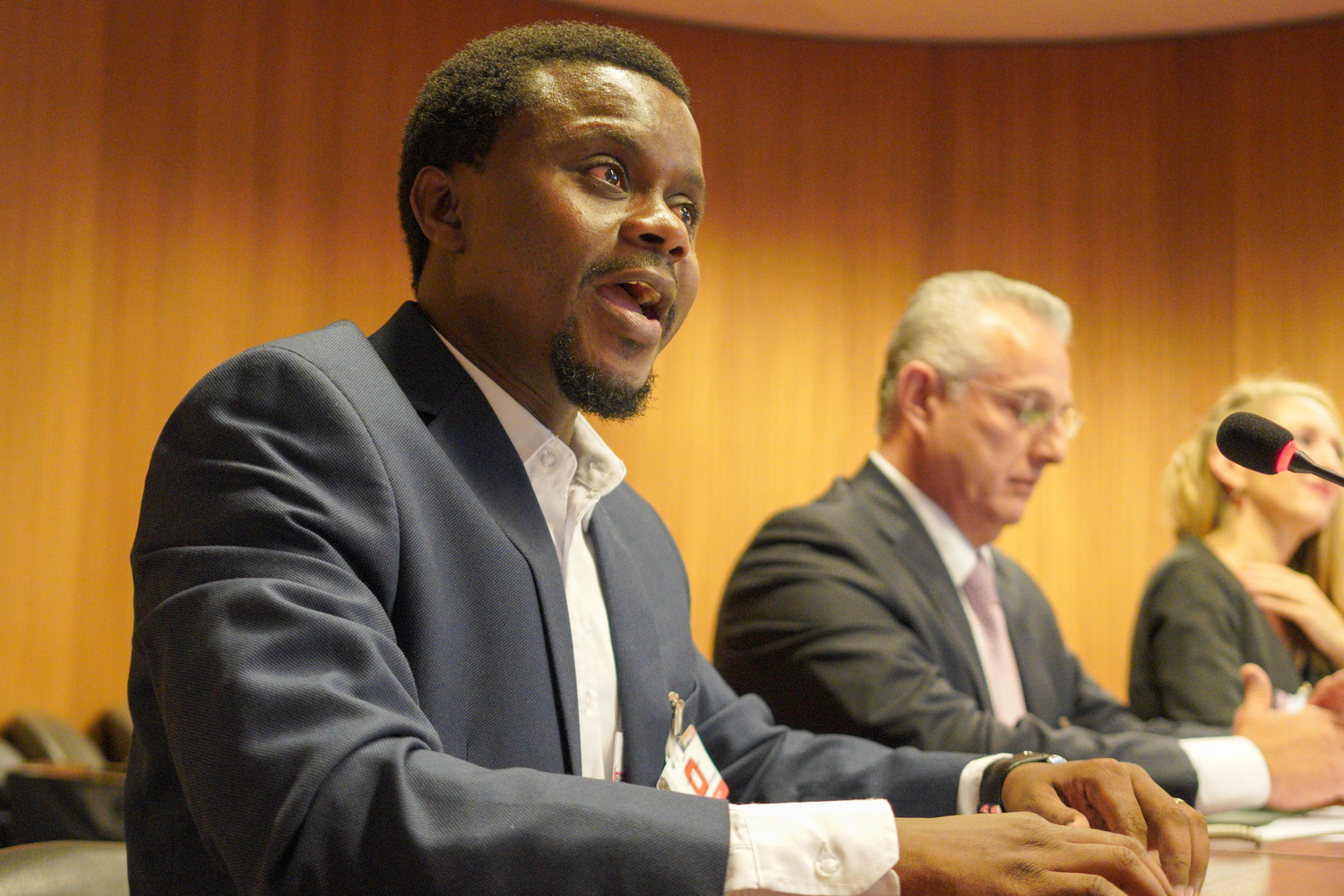
Robert Hakiza, who fled the Democratic Republic of the Congo, speaks at the Forum in Geneva.
With record numbers of people worldwide forced to flee their homes, finding ways to help refugees support themselves is a better and more financially sustainable approach than relying on traditional hand-outs.
This was the message from participants in a session on boosting refugee self-reliance, which featured speakers from business, government and refugee communities.
“There was a time when I thought donating clothes and giving financial contributions would be enough,” said Tadashi Yanai, CEO of Fast Retailing, UNIQLO, who spoke in a video shown during the session.
“By creating such opportunities as vocational training, education and employment, I would like to support refugees holistically. Considering the increasing number of refugees, I believe this is the right thing to do.”
UNIQLO has programmes to help refugees get jobs in their stores, and speakers urged more private organisations to work with governments and local authorities to create opportunities for refugees to support themselves financially.
Robert Hakiza is Executive Director of Young African Refugees for Integral Development, based in Kampala, Uganda, where he has lived as a refugee for the past 20 years after fleeing the Democratic Republic of the Congo.
He said that for him and the refugees he works with, self-reliance means being able to come up with your own solutions to the problems you face. Bringing together refugees and the people they live and work alongside is key to changing not only people’s perception of refugees, but also integrating them into their local communities.
The point was echoed by Roman Alberto Cepeda Gonzales, Secretary of Labour in the Mexican State of Coahuila. For him, the first step is to help refugees and internally displaced people feel like they are part of their local community and its social life. This makes it easier for refugees to then find work and build a long-term future for themselves.
Brighter futures: early childhood development in crisis settings
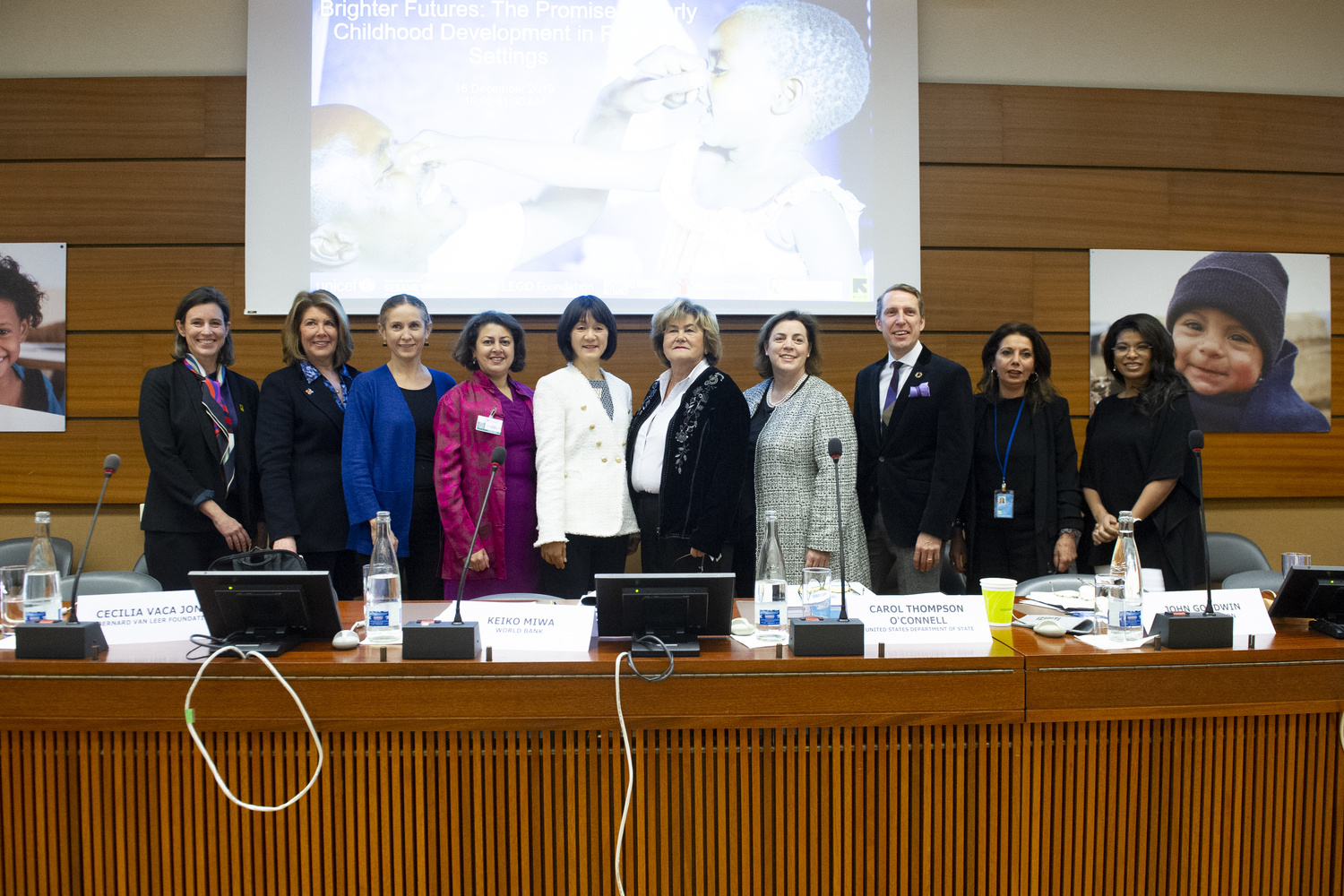
Participants gather to discuss ways of bringing brighter futures to refugee children.
Over half of the world’s refugees are children. Many will spend their entire childhood far from home, sometimes separated from their dear ones. They may have witnessed or experienced brutal violence and, in exile, are at risk of abuse, neglect, exploitation, trafficking or military recruitment.
The adverse impacts of conflict and displacement are especially salient during the early years of life when a child’s rapidly developing brain is exceptionally sensitive to environmental influence. There is an urgent need to prioritize and invest in young children and caregivers in refugee settings.
Children are especially vulnerable, but also incredibly resilient. By learning, playing and exploring their skills, they can find ways to cope, drawing strength from their families and communities. Collective action can prevent depriving an entire generation of opportunities and hope.
This was the focus of a spotlight session this morning on bringing brighter futures to refugee children, which showcased existing models of early childhood development programming in contexts of displacement, aligned with the Global Framework for Refugee Education.
“In the context of emergencies, young children face several visible and invisible challenges,” said Najat Maalla M’jid, Special Representative of the Secretary-General on Violence Against Children. “Children who experience extreme and adverse stress in their earlier years are at greater risk of developing cognitive, behavioral and emotional difficulties, which also reduces and delays their overall development process. If we fail to invest in providing integrated and multi-sectoral response to children, families and communities, we will pay the price later in higher social costs and lost economic opportunities.”
John Goodwin, CEO of the LEGO Foundation, which recently pledged a US$100 million grant to bring learning through play to refugee children impacted by protracted humanitarian crises in the Horn of Africa, stressed the importance of bringing “hope to people who find themselves in humanitarian crises, through quality play-based early development to every child in such circumstances.” This can be achieved, he said, by leveraging “the resources available, capturing what works and replicating it, to give a message of hope for those who are in displacement.”
Many states, international organizations, academia and civil society representatives pledged their support to education and early childhood development for both refugees and host communities, including the Intergovernmental Authority on Development, Save the Children, UNICEF, the University of Virginia and World Vision.
Geneva flies the flag for the Global Refugee Forum
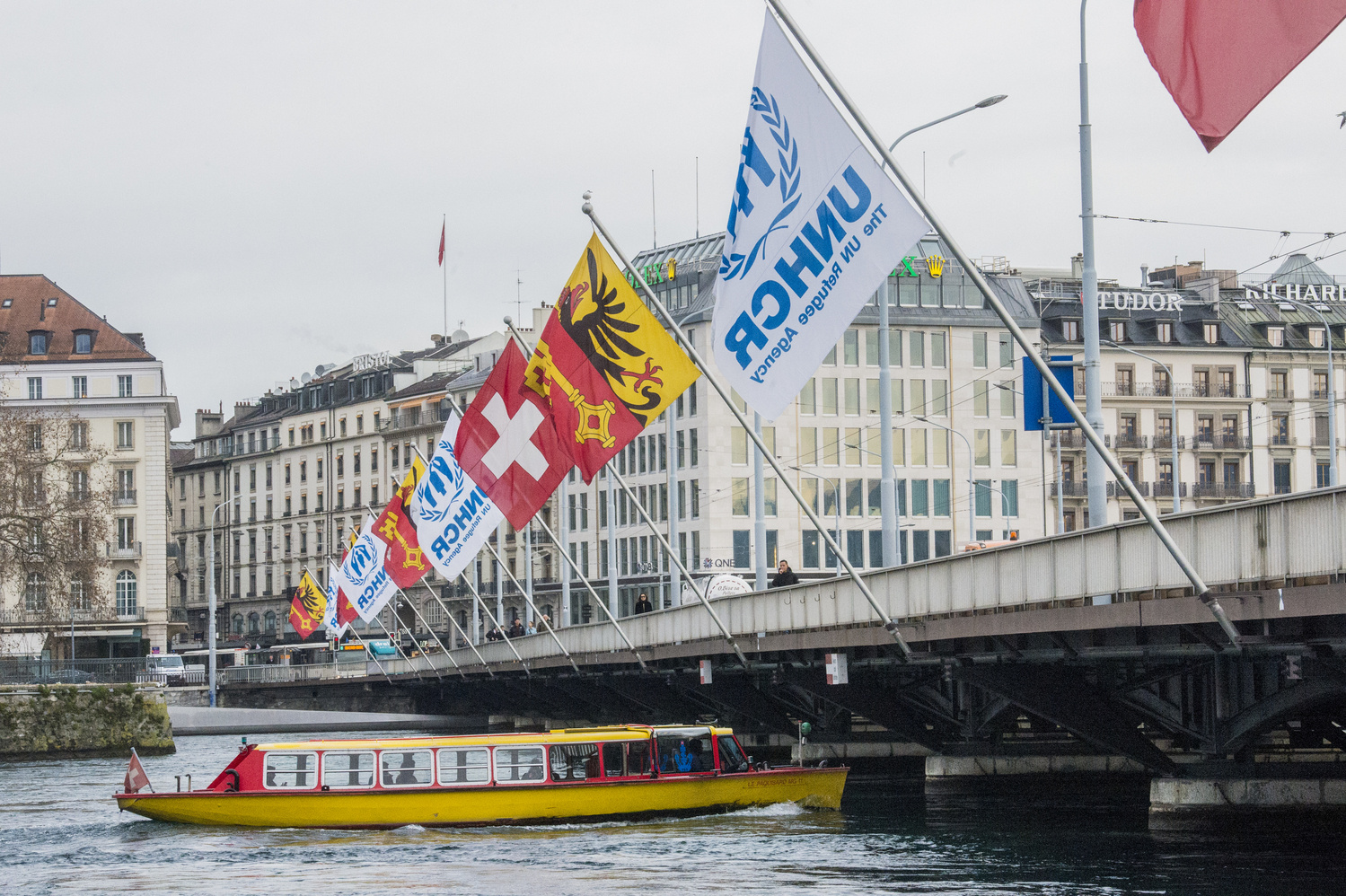
Flags on the Pont du Mont Blanc, Geneva, mark the opening of the Global Refugee Forum.
Highlighting Switzerland's role as co-hosts of the Forum together with UNHCR, the City of Geneva marked the start of the event this morning with a colourful display on the Pont du Mont Blanc in the city centre.
Global Refugee Forum flags flew alongside those of the Swiss Confederation and the Canton of Geneva along the length of the bridge, which marks the point where the Rhône leaves Lake Geneva.
From the Global Refugee Forum comes a global message: #EveryoneCounts
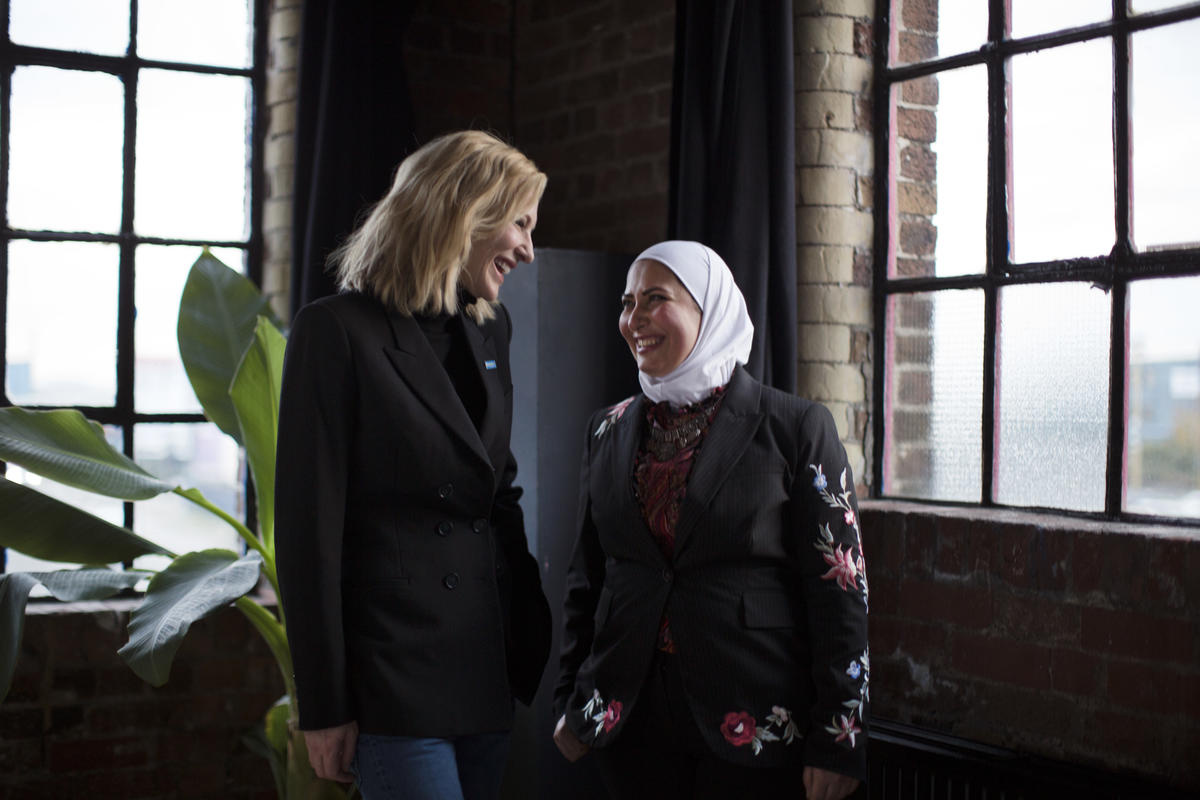
UNHCR Goodwill Ambassador Cate Blanchett with Syrian refugee and business woman Razan Alsous.
In this busy media world, what’s the best way to communicate the aims of the Global Refugee Forum to a global audience?
The answer: Tell stories of the strength and resilience that refugees can bring to their new communities. And build understanding and awareness that there are solutions for refugees, and that everyone has a role to play in finding and developing those solutions.
And how best to reach a global audience with messages these days? Use social media.
That’s the rationale behind the #EveryoneCounts campaign, launched by UNHCR, the UN Refugee Agency, ahead of the Global Refugee Forum.
The social media campaign rallies support behind the core message that “everyone has a role to play” in helping refugees. It also highlights how we can all help to counter xenophobia, intolerance and fear, and empower refugees to rebuild their futures.

Sesame Street heads to the Forum
The Forum is bringing together thousands of delegates from around the world including refugees, heads of state and government, UN leaders, international institutions, development organizations, business leaders and .... Sesame Street.
Grover -- in UN blue -- made his way to the venue in Geneva on Sunday.

Finding solutions for refugees and host countries
The aim of the Forum is to generate new approaches and long-term commitments from a variety of actors to help refugees and the communities in which they live. One of the priority areas for action is education, in order to help more young refugees like Sidra, a star student from Syria, to fulfil their potential.

Refugee crafts go on sale at Geneva Christmas market
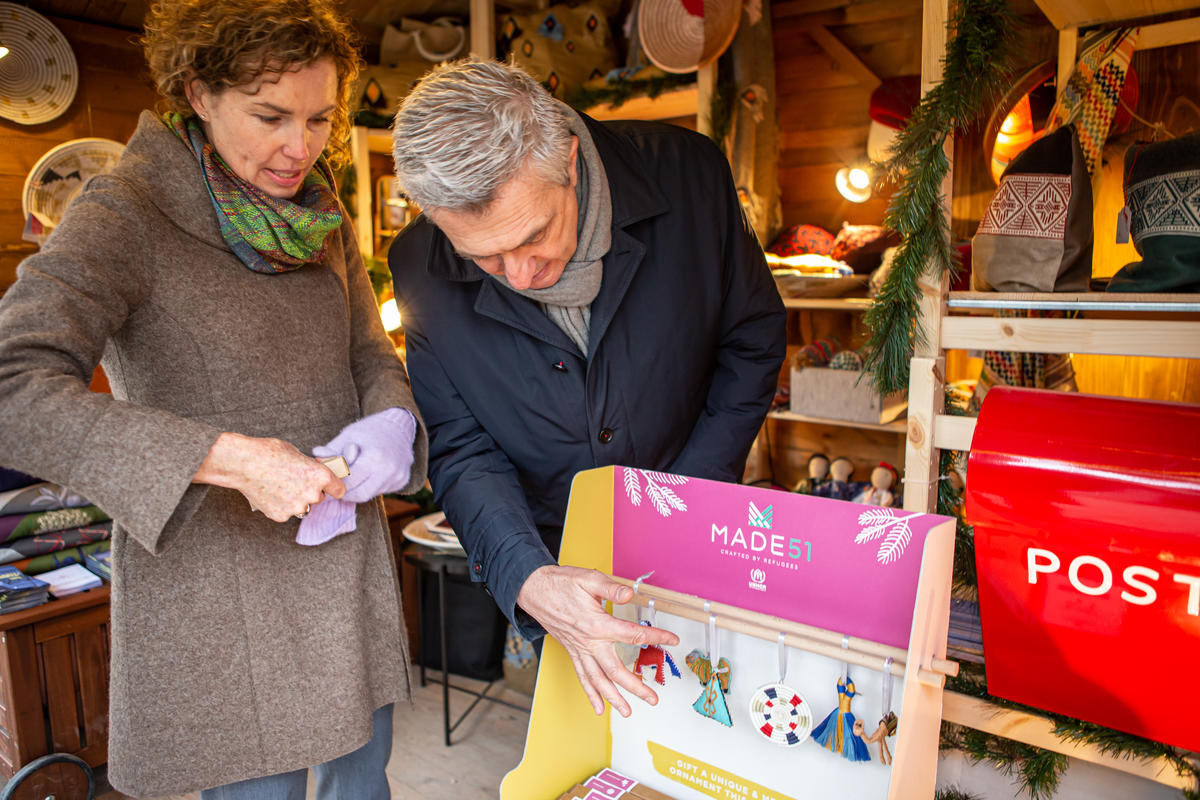
UNHCR's Heidi Christ and UN High Commissioner for Refugees Filippo Grandi browse refugee handicrafts at a Christmas market in Parc des Bastions, Geneva.
Captivating lampshades, bold jewellery and intricately crafted boxes are among scores of products made by refugee artisans that went on sale in Geneva in the run up to the Global Refugee Forum.
Supported by UNHCR, the UN Refugee Agency, products made by refugees from about a dozen countries worldwide have gone on sale at the city’s Noel aux Bastions and at the local fashion store Bongénie Grieder.
It was made possible by MADE51, a UNHCR initiative that seeks to connect talented displaced artisans from countries as diverse as Afghanistan, Burundi, Mali, Somalia and Syria with international outlets for their goods.
Attending the outdoor market, UN High Commissioner for Refugees Filippo Grandi, thanked Swiss and local partners for helping to make it happen. He was particularly pleased by the interest shown by customers perusing the stalls.
“The presence of our MADE51 Brand at Noël aux Bastions, is a great opportunity to bring the stories behind the products and the concrete objectives of the Global Refugee Forum to the Swiss audience,” Grandi said.
The refugee artisans, who are all paid a fair wage for the work, use traditional processes such as hand-hammered copper and bronze to make bowls and bracelets, weaving baskets from grass, and knotting rugs.
“It is heartening to see how the Swiss public is responding to MADE51,” said Heidi Christ, UNHCR’s Global Lead for MADE51. "Customers are excited to have the opportunity to buy MADE51 products because they are beautifully crafted and make thoughtful gifts."
She added: “By gifting, customers also spread the word to their friends and family that refugees can be talented contributors, if given the opportunity.”
For more information, please visit the Global Refugee Forum web page
For a complete list of pledges at the Global Refugee Forum, see the dashboard here.


